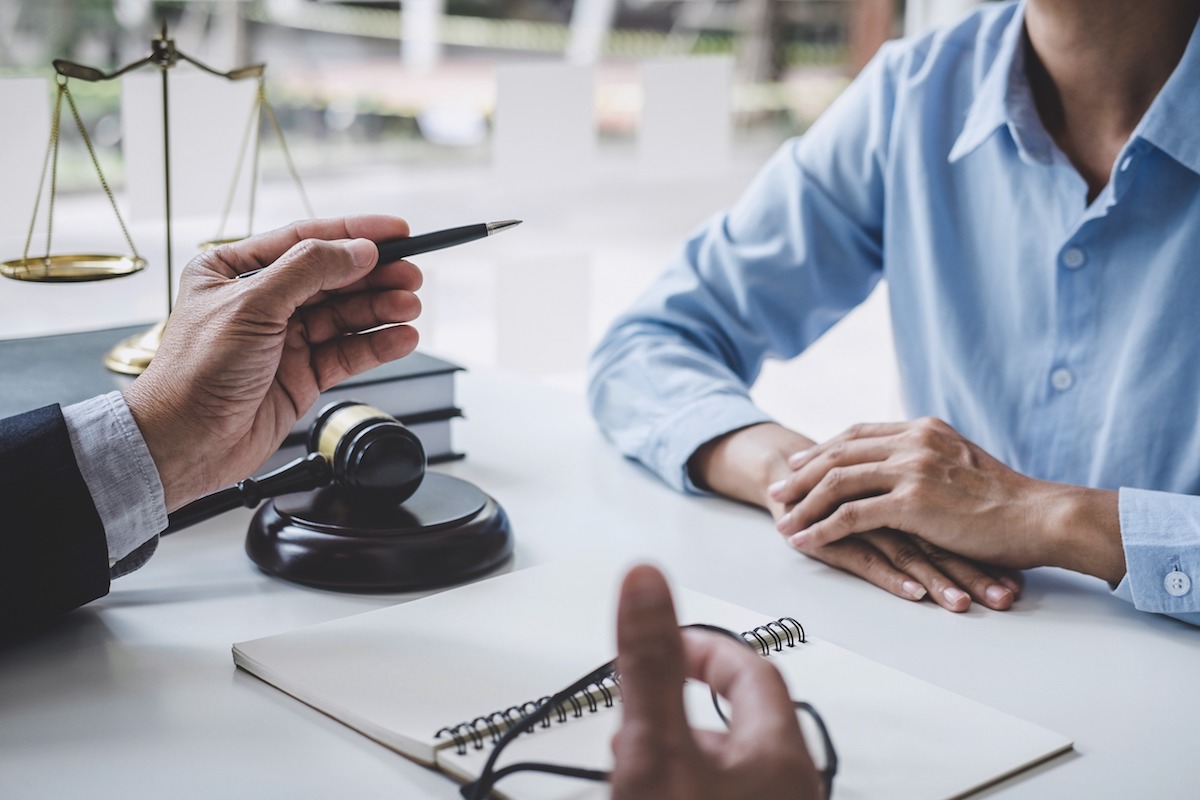
14 Jun Tips For Maintaining Composure and Staying Focused During a Legal Deposition
Tips for Maintaining Composure And Staying Focused During A Legal Deposition
When you are getting ready to go into a deposition, it is important to prepare. Preparing for the deposition is key to maintaining your composure and staying focused. You cannot allow the court itself to be overwhelming, and you need to be ready for a range of potential questions. Practicing potential questions in advance will help you be prepared for the actual deposition process and stay composed throughout.
Preparing For A Deposition
To better prepare for a deposition, try these suggestions for remaining composed and focused during the legal process. Ultimately, the best recommendation is to find what works best for you in terms of staying calm and attentive.
What Is a Deposition?
A deposition is when lawyers of a lawsuit ask a witness (called a deponent) questions and record their answers. The witness must swear to tell the truth, and everything they say is written down by a court reporter.
- The lawyers use this information to prepare for trial, and the deposition can also be used as evidence in court.
- The deposition usually takes place in a lawyer’s office, with both sides’ lawyers present, as well as the court reporter and the parties involved in the lawsuit.
- Even though the deposition may seem casual, it is important because anything you say can be used against you later on.
How To Prepare For An Opposing Attorney?
It is important to be ready for the other lawyer, who will highlight the defendant’s strengths, downplay their weaknesses, and try to find problems with your case. They may even try to ridicule your story or allege that you are mistaken or untruthful. During your deposition, the person questioning you may try to lead you into admitting things by asking confusing or leading questions; therefore, it is important to be vigilant and ready. You should always be honest, but also be careful.

Tips to Maintain Composure and Stay Focused During a Legal Deposition
These suggestions will help you to become a strong witness during your deposition:
1. Be Prepared
- To prepare yourself and provide an honest impression, it is crucial to refresh your memory by reviewing the facts of your case with your dedicated attorney. This will not only help you address any weaknesses in your case but also remember and articulate all the strengths, including details about the defendant’s liability and the impact of your injuries on your life.
2. Pause When Answering
- To avoid revealing extra information, it is best to listen to the complete question before responding; don’t assume you know what the question is, and take a moment to think before answering. This also allows your lawyer to object, necessary.
3. Do Not Give Out Extra Information
- Only provide answers to questions that have been asked and be truthful. If you are asked a “yes” or “no” question, only answer with “yes” or “no” unless asked to explain further by the opposing attorney. Keep your responses concise, and do not volunteer additional information.
- To avoid your case, refrain from providing additional information that the opposing attorney has not requested.
- This is because it may disclose something that the opposing attorney would not have considered asking.
- It can also prompt them to ask further questions that could be detrimental to your case. Instead, simply respond to the question asked and remain silent until you are asked the next.
4. Know What Is Being Asked
- To avoid harming your case, always ask for clarification if you do not fully understand the question or did not hear it. By answering a question, the opposing attorney assumes you understood it.
- You have the right to understand it before you give your response. In case you mistake a question for a different one, asking for clarification or rephrasing can help you to avoid giving an incorrect answer.
5. Always be Truthful
- It is your responsibility, to tell the truth, even if you believe it may harm your case. Concealing the truth and being caught can have more detrimental effects on your case than being honest about any weaknesses.
- To prepare for your deposition, discuss any perceived weaknesses in your case with your trusted lawyer so that you can address them effectively if they come up during questioning.
6. Stay Calm
- It is important to leave a positive impression on the defense attorney, who will report back to the client representative or insurance company responsible for settlement and trial decisions. Being upset, argumentative, or rattled in response to the defense attorney’s questions during your deposition will not create a good impression.
- This behavior could lead the opposing attorney to assume that you would perform poorly during cross-examination in front of a jury. Remain professional and polite even if the questioning becomes challenging. If you stay composed and leave a positive impression on the defense attorney, it will also reflect favorably on you in front of the jury.

7. Know the Answer
- If you asked a question during a deposition and don’t know the answer, it is okay to say, “I don’t know.” It is better than guessing and potentially giving incorrect information. Similarly, if you do not have first-hand knowledge of the topic being asked about, refrain from guessing and instead indicate that you do not have any personal knowledge of the matter.
8. Let Them Know That You Do Not Remember
- If you cannot recall a certain fact or answer to a question, it is best to admit it. Even if you knew it before but can’t remember it now, be honest about it. If you feel fairly confident about an answer but not completely certain, it is still important to express that uncertainty. Avoid making assumptions if your memory you.
9. Be Accurate in Your Answers
- To be accurate, maintain your original answer when an opposing attorney asks the same or similar question repeatedly or in different forms. They may try to manipulate your testimony, so don’t allow them to coerce you. Stick to your point and do not let them put words in your mouth.
10. Know the Fine Print
- In a personal injury lawsuit, your deposition may include the presentation of documents and photos as evidence. The defendant’s lawyer may ask you questions or read sections of these materials to you, and then inquire about them.
- To avoid giving incorrect information, it is important to only testify about documents or photos that you have carefully reviewed and are knowledgeable about.
11. Know When to Be Quiet
- To avoid feeling pressured to keep talking, remain silent after giving your answer until the next question is asked. Defense attorneys may try to make you feel uncomfortable by using silence and non-verbal cues, but don’t let them manipulate you into saying more; just wait for the next question.
12. It Is Advised Not to Bring Any Documents to the Deposition
- When getting ready for your deposition, don’t bring any notes, diaries, or documents that you need to review or use during the meeting. If you do, you might be questioned about every detail by the defense lawyer.
- Also, some of these written documents could be private information and by using them to assist with your testimony, they can become accessible to the other side. It’s best to work with your legal representative to prepare for the deposition and not bring any documents.
13. Deposition Questions May Sometimes Cover Topics That Are Not Relevant to the Case
- During a deposition, the opposing counsel can ask about a wide range of topics. They can and will go beyond the incident in question, as depositions are used for discovery.
- This can include personal information such as education. This can also include work experience, relationships, criminal history, credit history, past accidents or lawsuits, and more. These questions can touch on private and sensitive matters that are unrelated to the case.
14. Prepare for Objections
- If the attorney asks a question to which your lawyer objects, don’t answer until they have finished. The court reporter will record for the judge to review later in the trial.
- You will usually need to answer the question even if an objection has been made. However, some questions are too because they seek confidential information.
15. Clarify Your Answers
- You can review and make corrections to the transcript of your deposition. It is recommended that you bring up any concerns or mistakes during the actual deposition before the transcript is prepared.
- Use the break to discuss any issues with your trusted legal advisor or attorney. You can clarify or add to your previous answers later when the deposition resumes.
16. Look Comfortable
- Remember to stay calm and confident during the deposition. Being prepared and truthful is crucial, but don’t forget to relax and trust that the truth will come out. By following the tips provided, you can make a positive impression and strengthen your case.
Summary
Preparing for a deposition requires care and accuracy when answering questions. Testify only documents or photos you have carefully reviewed. Remain silent after answering, and don’t bring any notes or documents to the session. The opposing counsel may ask personal questions unrelated to the case, so stay calm. Do not let them manipulate your responses. Confirm any objections with your lawyer. Review and make corrections to the transcript, and practice remaining comfortable throughout the entire deposition. With proper preparation, you can confidently present yourself in the most positive light possible.





